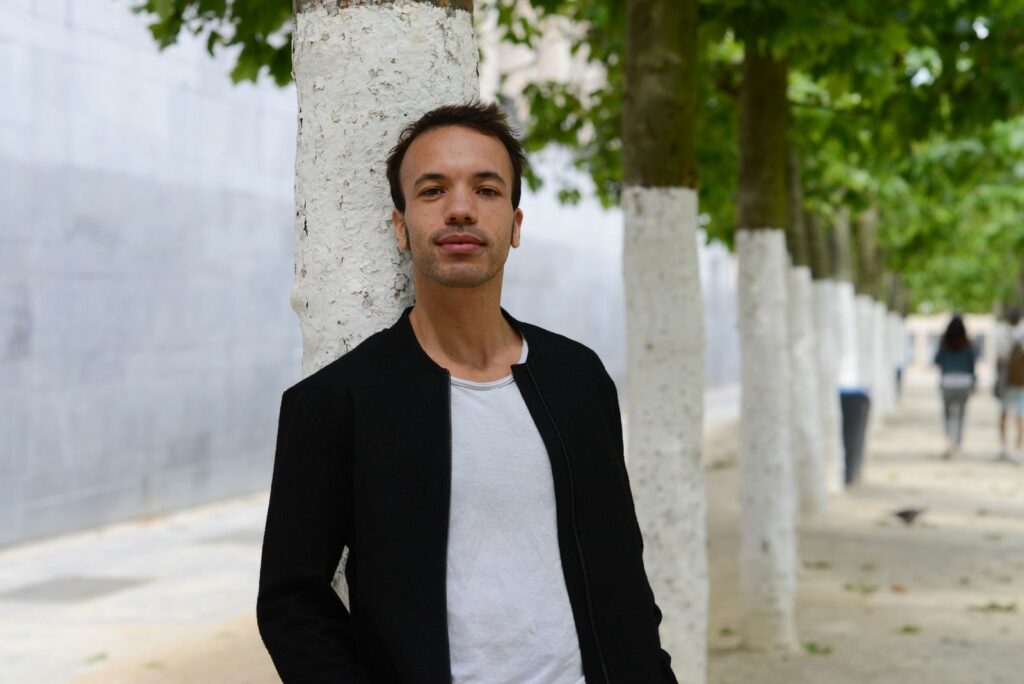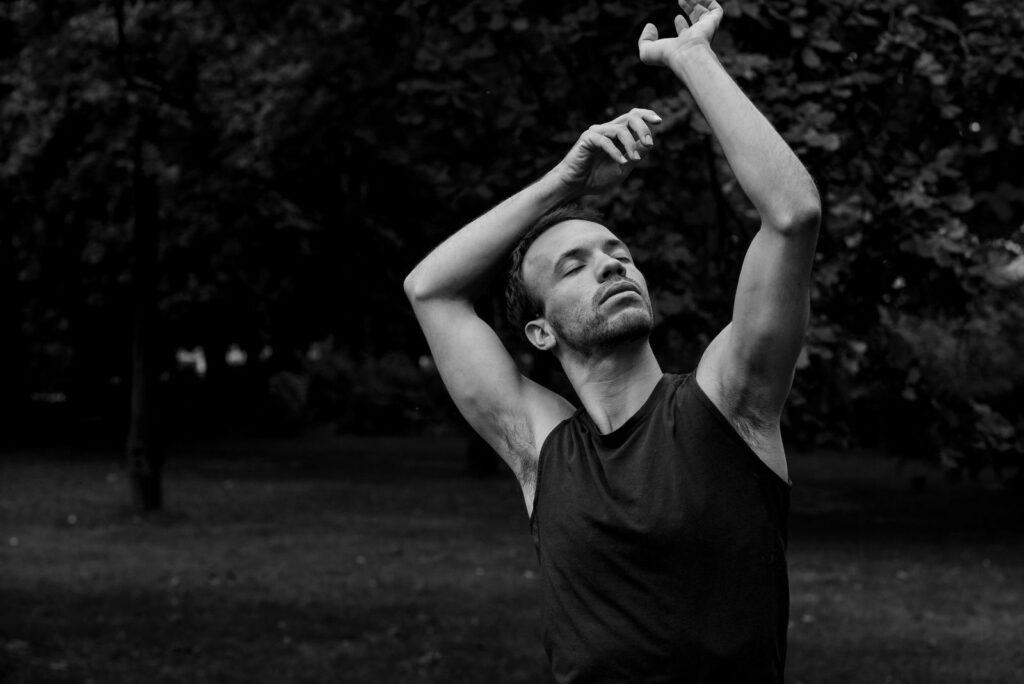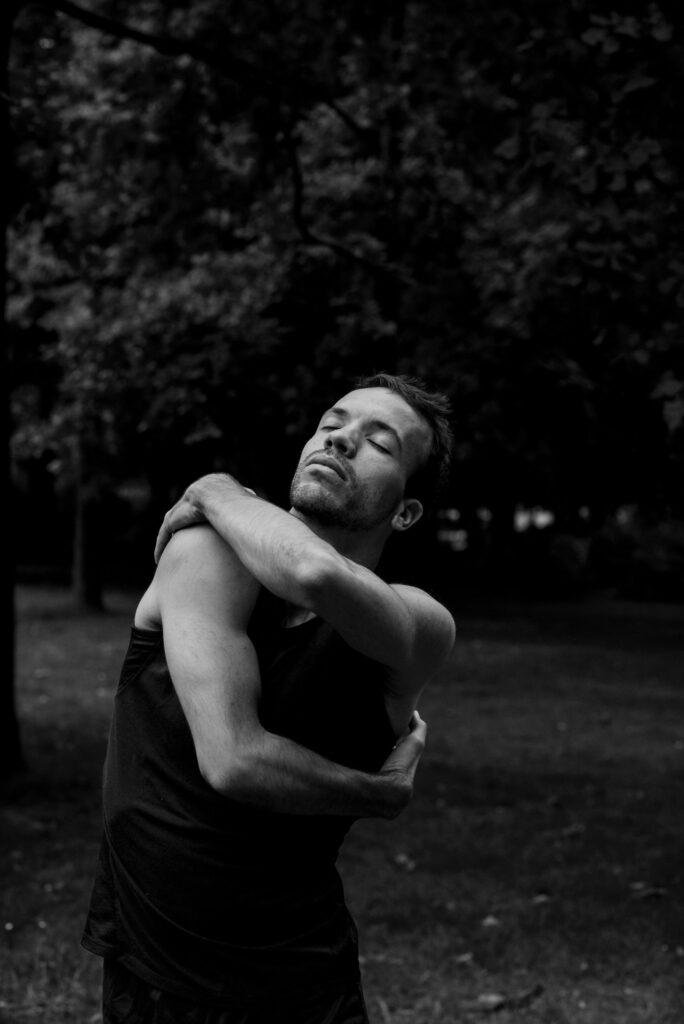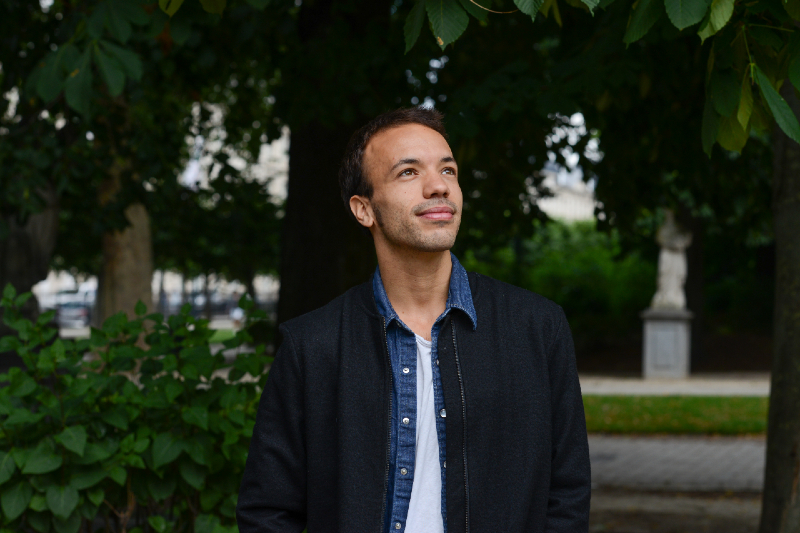Hugo Mega is an artist, yoga teacher and transformative life coach. He’s a feminist man that hosts the “masculinities” men’s circles where he invites men to step into a journey of self-inquiry towards authenticity and away from self-alienating masculine gender norms and expectations.
His methods are introspective, retrospective and progressive. His work is rooted in conditioning and deconstruction, of oneself, the binary worldview and the patriarchy.
I spoke with Hugo to explore his perspective on masculinity.

What is your project “masculinities” about?
It’s about finding collaborative ways to be a man, finding that there is a multiplicity of ways to be one. There isn’t a template that one should fit. So together, we come up with our own individual male identity.
The idea came through my own deconstruction, both artistically and therapeutically, I’ve been very busy with this division between masculine and feminine inside myself, because I grew up a very effeminate boy. I always thought that my problem with myself was my bigger feminine side, so I spent so much time trying to be at peace and comfortable with my femininity.
At some point, I realized that the problem wasn’t the feminine, it was the masculine in me. I had also concluded that I was terrified of men. But I didn’t want to be afraid of men anymore. That’s when I shifted the focus to start healing the masculine in me. This got me interested in circles for men.
What made you start hosting these yourself?
It was one of those destiny occasions, I was at the right place at the right time. I attended my first men’s circle at a yoga festival in 2019. That’s where I saw for the first time that, in a group of 40 men, there were so many different ways of being a man and all of us were suffering from the same things. Me, the old man, the alpha male, the nerdy guy – we were all talking about the same disconnections, difficulties and struggles.
How is it possible that with such different backgrounds from all over the world, we were suffering from the same things? That made me reconnect some dots with feminism within patriarchy.
Coming back from that trip, I felt ready to do this and so I started the “masculinities” circles. Because I wanted to contribute to a greater good, to a freer and more collective and embodied way of being a man.
You said you were all pointing out the same things, do you have any examples of that?
The disconnection to oneself, feeling disconnected from one’s own freedom of being oneself, even when surrounded with one’s friends. The disconnection to the father and positive masculine role models.
There was also this struggle to free oneself from these masculinity codes and guidelines that we were taught as boys – a lot came down to “what I heard I should be as a boy”.
All of these were said in different ways but I feel like they all end up producing the same results. Even if it’s said differently, they were all leading to the same conclusion – individual repression, condition, disconnection, lack of authenticity.
How would you define masculinity – or masculinities?
I feel that there is some difficulty here in answering this question, due to the binary construction. Are we talking in a binary way or a general way? I think, ideally, the goal is for us to deconstruct the binary.
The process that I’m involved in is leading more towards ways of being human, not ways of being a man versus being a woman. So for me, I would bring it back to a way of being a human.
In that sense, for me, humanness is about the wholeness of beingness, freedom and liberation, authenticity. That’s what I would bring it towards, as in my definition of masculinity.
I also believe we all have both masculine and feminine energies inside of us. For me, it’s about asking oneself, what does being feminine or masculine mean to me? What are the qualities that are inherent to each side? To then ultimately, break down that wall separating the two.
To me, it boils down to qualities that I want to cultivate in myself, either that I am lacking or that I want to transform or work with. For example, there is this stereotypical view that the feminine is more nurturing and caring and kind. But why isn’t the masculine? A great father for me would also be nurturing, caring and kind – right?
A lot of your work is based on deconstructing one’s “conditioning”, could you explain what that means?
For me, conditioning is a gradual process of becoming, it’s a multitude of factors that lead you to be who you are today.
In my current understanding, conditioning is like a series of layers. Somewhat like an onion – somewhere in the middle of the onion, there is the real me. But on top of that, there are all these layers that I need to peel – or deconstruct. “Conditions” are those layers. A lot of conditions are passed through trauma, beliefs, values and many things that you’re exposed to growing up and have adopted – consciously or subconsciously.
Trauma has a spectrum, even little feelings of disconnection can be a trauma. So it’s all about the impact it has on the being.
For example, I know that being an only child has led me to be a people-pleaser. My personal trauma is rooted in feeling lonely growing up, desperately wanting a connection.
I strongly believe that each trauma will lead to a pattern. Mine was with considering my best friends as my “brothers”. The subconscious expectations that I put on these men to fulfil a role led to disappointment and pain.
I had entered a dynamic of pleasing, being the nice boy, saying yes to everyone and putting everyone above myself. I felt a responsibility and duty towards all my friends to please, help, save and fix people’s problems. Which led me, at the age of 25, feeling like I was burning out from my own social life. While it was really about me starting to listen to me and respecting me and starting to place boundaries, saying no and being ok with that.
How does conditioning portray itself in masculinity and patriarchy today?
Patriarchy is a framework of conditioning on its own. It says that men are supposed to oppress. Not that there is a written template that says so in these words but it does say that men need to be strong, dominating, providers and in control.
These types of guidelines trigger ways of men relating to others in a way that leads to racism, colonialism, imperialism – all of the oppression that we experience today stems from this conditioning inherent to patriarchy that states that men are and should be superior to other beings.
Then you have layers to this prism, such as a belief that a white man is superior to other races of men – that is white supremacy.
How do you go about deconstructing all of this?
All paths lead to Rome. There are many ways to go about deconstructing patriarchy. My process is highly introspective and therapeutic. Deconstructing myself is how I end up deconstructing patriarchy in me and therefore deconstructing it in my dynamics, relationships and hopefully the system that I’m participating in and hopefully no longer subscribing to.
For me, it’s really about understanding who you are, what you’re made of. By asking questions like: What animates me? What motivates me? What moves me? What triggers me? What makes me react in what way?
It’s really about becoming extremely intimate with yourself to be more and more whole, complete, at ease and at peace with who you are – flawed but in construction – so that we can show up and be more present with each other as well as be supportive of the other and their own deconstruction.

Could you describe the process you use in your men’s circles?
All of the conversations we have come from an inquiry where I use imagery exercises that tap into the subconscious seeing and understanding. I use those exercises to trigger and start a conversation.
Depending on the theme of the circle, it’s kind of like a guided meditation where I ask a few questions and the participants pay attention to the image I’m suggesting. How are they relating to it, what do their emotions and feelings say about it? What is the memory that comes up? Then it’s about us uncovering.
Everyone speaks from their own experience, which then creates an image of how it is they relate to that theme. That may be a privilege, vulnerability, shame – whatever it is that we’re discovering and uncovering. It can be extremely vulnerable, yet a very empowering experience.
In these circles, we cultivate vulnerability as a strength rather than a weakness. This sometimes creates a domino effect, where someone’s vulnerability really opens up and elevates the depth of the conversation a lot.
The more vulnerable we are, the more we create connection and empathy and compassion.
Do you think men need their own wave of what women had with feminism?
I honestly don’t know. Having done this work for the past few years, I’m feeling a wave of entrusted men that are coming to me with this idea of deconstruction. If there is a necessity for a wave, I feel like it is happening. And it cannot be dissociated from feminism because it started through feminism and it’s feminists who kick-started the wave. Maybe it’s more targeted around the deconstruction of patriarchy, of oneself. But I feel it’s the same wave of feminism.
I’m actually really excited at the moment because now, post-confinement, I see that the amount of men that show up in my circles has almost doubled in number. At each circle, there are three new men and they keep on coming and showing up. So there definitely is a wave of interest and desire to transform, to have better mental health and to show up differently.
In opposition to “Toxic Masculinity”. What would “Healthy Masculinity” look like?
I would go back to rather see it as qualities of healthy humanness rather than masculinity. For me, these are the basics of humanness – consciousness, liberation, vulnerability, wholeness, flawed, humble and extremely resilient to keep learning from mistakes made and in partnership with others.
When I speak to that humility and resilience to keep learning, it goes back to deconstructing the patriarchy and being a feminist man. It’s being humble enough to understand that I am flawed and asking the right questions.
How can I start to be more conscious about it in a way that I’m holding space for others to tell me what I’ve done wrong? Can I sit with that discomfort of knowing that there is something that has been done wrong or that could have been done differently?
For me, this humility is at the basis of this work and this way of being which is meant to be generative. Can I be more co-creative with what is happening around me? Can I be more intentional about this? Instead of always being on auto-pilot, can I pause to try to think and understand?
It’s not about ways of being a man, it’s about ways of being a human, of holding the qualities of being a good person. Being there for myself, and therefore being there for the other as well.
So the work is not only about deconstructing, but also reconstructing?
I don’t think just deconstructing is healthy. To do some deconstruction, you need to do some building. It’s a two-step movement, both aspects need to work together, it’s like hard work and resting. Then, you do a little bit more, and so forth. In that way, it’s a progressive task.
To put it simply, I see it as personal development, which is a never-ending journey, that we should never strive to finish because that would mean stagnation and the end of growth.
I feel like my work is to empower and make men more responsible.
I know that power comes with a tricky perspective because men are privileged and in a position of power but this here is a different type of power. It’s empowerment through agency, responsibility and accountability.

You may also like
-

Laetitia BICA : If there’s nothing at stake, why play?
Driven by her Sicilian roots and passion for photography, Laetitia BICA challenges industry norms through
-

Martin PY : “Queer stories always get people talking and thinking.”
Martin PY, hailing from the coastal village of Carqueiranne, France, found his passion for storytelling
-

Eden Fern and his Garden of Secrets
Meet Eden Fern, an emerging artist whose musical universe combines personal growth with creativity. With
-

Emmanuelle: Harmonies of Identities
KET Magazine x Black History MonthAlex Perry: The Prince of Xperrymental Music Porcelain Id: Embracing
-

Porcelain Id: Embracing Multitudes
KET Magazine x Black History MonthAlex Perry: The Prince of Xperrymental Music Porcelain Id: Embracing
